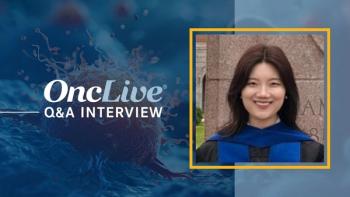
Emerging Agents for Mantle Cell Lymphoma
Transcript:
Brad S. Kahl, MD: We’re looking forward to seeing the results of the acalabrutinib trial in mantle cell lymphoma, and there are other trials that could also have the potential to influence the standard of care. There’s a trial called SHINE, which is looking at bendamustine/rituximab plus/minus ibrutinib. And there’s a United States Intergroup trial called E1411, which also used the BR backbone and tested bortezomib in the induction therapy, and then tested the role of lenalidomide combined with rituximab as maintenance therapy. So, all these trials, which will read out in the next few years, have the potential to change the landscape for upfront management of mantle cell lymphoma.
John P. Leonard, MD: There are a number of different categories of novel agents that are under evaluation in mantle cell lymphoma. And so, it’s very exciting and I think many patients want to participate in clinical trials of these agents. One area is novel monoclonal antibodies. We’ve talked about rituximab, a CD20-directed antibody. There are a number of others including obinutuzumab, which is approved in CLL and in follicular lymphoma. We don’t know yet in mantle cell lymphoma whether or not obinutuzumab or any other anti-CD20 antibody offers significant advantages over rituximab. So, while that’s an important area of research in lymphoma in general, the jury is still out in mantle cell lymphoma whether those agents offer something new.
We know that the PI3 kinase inhibitors have activity in mantle cell lymphoma. The activity in mantle cell lymphoma is really related to the isoforms that are inhibited by specific PI3 kinase inhibitors. So, for instance, idelalisib is FDA approved for follicular lymphoma and for CLL. It is a delta isoform inhibitor of PI3 kinase. And idelalisib has activity in mantle cell lymphoma, but the response durations are quite short, on the order of just a few months. That reason is because the alpha isoform of PI3 kinase is upregulated and that provides resistance. And so, the PI3 kinase inhibitor, idelalisib, does not seem to have a major role in mantle cell lymphoma at this time. But there are other PI3 kinase inhibitors that are being developed, particularly copanlisib that’s in clinical trials now, that might have more activity in mantle cell lymphoma. So, the story is still out also on the PI3 kinase inhibitors.
Other agents that are active are venetoclax, the BCL2 inhibitor. Venetoclax has a high response rate in CLL. It’s approved in CLL, and early studies suggest a high response rate also in mantle cell lymphoma. And so, there are single-agent studies of venetoclax. There are also combination studies with ibrutinib, with antibody-based therapy, to see if that combination can improve the response rate and the durability of ibrutinib therapy. So, venetoclax, the BCL2 inhibitor, clearly is a drug that is under active investigation and seems to have some promise. Finally, there are the cell cycle inhibitor drugs, and there are a number of them that are approved in breast cancer—CDK4 inhibitors, CDK6 inhibitors. And these agents, because of the mechanism of mantle cell lymphoma and the cell cycle activation, are also in clinical trials. There are several of these agents in mantle cell lymphoma, both alone and in combination with other agents.
There are a number of interesting and emerging combination approaches in mantle cell lymphoma, and I think those range in a number of different categories. The first group are those that are being combined with chemotherapy. So, bendamustine/rituximab or R-CHOP have been combined one way or another with bortezomib, with ibrutinib, with lenalidomide, and with Ara-C. I would say also in some combinations, Ara-C, not being all that new, is an important drug in mantle cell lymphoma. And so, we’re awaiting the results of randomized trials to ask, does adding a new agent to the standard regimen in the case of BR, for example, improve outcomes with the toxicity and the risk/benefit ratio?
So, one area is chemotherapy novel agent combinations. The second area is novel combinations, and those would include, for instance, the use of venetoclax with ibrutinib to see if using 2 drugs with novel non-chemotherapeutic mechanisms of action could work even better. And, again, these are exciting drugs. If you go to annual meetings of ASH and ASCO, you’ll see small phase I, phase II trials, and ultimately, I think we’re going to need the randomized trials to show, is a combination better than sequential or single-agent treatment?
It’s a very exciting time to treat patients with mantle cell lymphoma. This has, over many years, evolved from a disease that was relatively hopeless, relatively constrained in its outlook. And over the course of just really less than a decade, we have clear survival benefits. We have new agents approved. We have new combinations, new options for patients. We have a great understanding of the biology of mantle cell lymphoma, the prognosis of mantle cell lymphoma moving toward precision and targeted therapies.
While, obviously, I don’t want to say it’s a great time to be a patient with mantle cell lymphoma, it is certainly great that we have many things on the horizon for these patients, many new things already in the clinic. And I would say that the outlook for mantle cell lymphoma patients is really looking more and more encouraging. I think it really, before long, will be a disease like indolent lymphoma where I’m hopeful we can make it, if not curable, at least something that patients die with rather than die from, and can live a relatively normal life and manage it. I really do think that day is in sight for an increasing number of patients even now.
Transcript Edited for Clarity




































